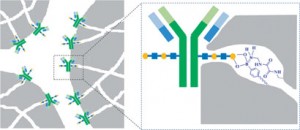A polymer functionalised with boronic acid promises a cheap and quick way to purify antibodies for disease studies, according to scientists in China.
Antibodies, also known as immunoglobulins, are used to investigate disease diagnostics and treatments. They are Y-shaped proteins used by the immune system to identify and neutralise foreign objects such as bacteria and viruses. Capturing and purifying antibodies is essential for these investigations.
The current gold standard for capturing the antibody immunoglobulin G (IgG) uses protein A – a bacterial protein that targets a region at the bottom of the Y part of the IgG molecule – in chromatography. However, disadvantages associated with this method, such as poor protein stability and harsh conditions for releasing the antibody afterwards, inspired Zhen Liu and his team at Nanjing University to look for alternatives.

The antibodies were bound to ligands that were embedded in the mesopores of a polymer
Read the full story in Chemistry World
Link to journal article
Restricted access boronate affinity porous monolith as a protein A mimetic for the specific capture of immunoglobulin G
Yunchun Liu , Yue Lu and Zhen Liu
Chem. Sci., 2012, Advance Article, DOI: 10.1039/C2SC20125A










